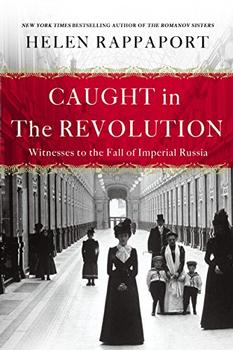Summary | Excerpt | Reviews | Beyond the Book | Readalikes | Genres & Themes | Author Bio

Petrograd, Russia, 1917 - A World on the Edge
by Helen Rappaport1
'Women are Beginning to Rebel at Standing in Bread Lines'
In November 1916, Arno Dosch-Fleurot, a seasoned journalist working for a popular US daily – the New York World – had arrived in Petrograd fresh from a gruelling stint covering the Battle of Verdun. A Harvard-trained lawyer, from a prestigious Portland family, he had turned to journalism and had been covering the war since August 1914, when his editor in New York offered what seemed to him the dream ticket: 'Suggest you might like to go to Russia.' But getting there wasn't easy in war-torn Europe; Fleurot had had to cross the Channel to England to pick up a boat from Newcastle to Bergen. This had been followed by a long rail journey through Norway, Sweden and north to the Finnish checkpoint at Torneo, where he had grown frazzled, arguing with customs officials about 'letting [his] typewriter though without paying duty'. As he boarded the train for Petrograd's Finland Station, the customs officer had attempted to defuse his enthusiasm: 'I know how your papers like sensations,' he said, 'but you won't find any in Russia, I am afraid.' Fleurot was expecting his assignment to last twelve weeks or so; in the end he would spend more than two years in Russia.
Although he had wired ahead and booked a room at the Hotel de France, on arrival he found that it was full. They offered him the billiard-table to sleep on. It was, he recalled, very hard, 'and more conducive to reflection than sleep'. He was excited to be in Russia after two years on the Western Front, but this was virgin territory for him and he was full of all the classic preconceptions:
I checked up on my notions about Russia and found I had a sordid one from reading Dostoievsky's Crime and Punishment, a tragic one from seeing Tolstoy's Resurrection, a terrible one from reading George Kennon's Darkest Siberia. I recalled for the first time in years, stories a nurse of Finnish origin used to tell us children about cruel czars poisoned by apples, of boyards who threw serfs to wolves … I had a jumble of Nihilists with bombs, corrupt functionaries, Red Sundays, cruel Cossacks.
Acknowledging how 'very little' he and his fellow Americans knew or understood about the Russian situation, Fleurot was soon given a briefing on what to expect by Ludovic Naudeau, correspondent for Le Temps, whose despatches from the Russian front had impressed him greatly. Naudeau had taken Fleurot to Contant's swanky restaurant for smoked salmon and caviar, where he warned him that 'Russia hits all writing men the same way'
You fall under a spell. You realize you are in another world, and you feel you must not only understand it: you must get it down on paper … you will not know enough about Russia to explain anything until you have been here so long you are half-Russian yourself, and then you won't be able to tell anybody anything at all about it … You will find yourself tempted to compare Russia with other countries.
Don't.
Fleurot and Naudeau were by no means the only foreign journalists in Petrograd just before the revolution broke. The reports of Reuters correspondent Guy Beringer, as well as those of Walter Whiffen and Roger Lewis of Associated Press, were being syndicated in the West, and there was an established coterie of other, mainly British reporters in the city: Hamilton Fyfe for the Daily Mail, Harold Williams, a New Zealander writing for the Daily Chronicle, Arthur Ransome of the Daily News and Observer, and Robert Wilton of The Times, all of whom were filing regular reports, though generally without bylines.† Fleurot was soon joined by fellow Americans Florence Harper – the first American female journalist in Petrograd – and her sidekick, photographer Donald Thompson, both of whom worked for the illustrated magazine Leslie's Weekly.
Excerpted from Caught in the Revolution by Helen Rappaport. Copyright © 2017 by Helen Rappaport. Excerpted by permission of St. Martin's Press. All rights reserved. No part of this excerpt may be reproduced or reprinted without permission in writing from the publisher.




Good as it is to inherit a library, it is better to collect one.
Click Here to find out who said this, as well as discovering other famous literary quotes!
Your guide toexceptional books
BookBrowse seeks out and recommends the best in contemporary fiction and nonfiction—books that not only engage and entertain but also deepen our understanding of ourselves and the world around us.